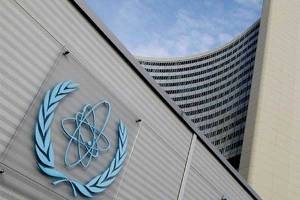Ru
|
Eng
Belarus to host five to six IAEA missions annually
24.03.2017

Belarus will host some five or six missions of the International Atomic Energy Agency (IAEA) annually, BelTA learned from the latest interview of Belarusian Deputy Energy Ministry Mikhail Mikhadyuk with the New Europe weekly.
Mikhail Mikhadyuk noted that Belarus has been cooperating with the IAEA in several areas for many years. “After the country’s decision to implement a nuclear energy program, the scope of cooperation was expanded to include nuclear power engineering. The cooperation between Belarus and the IAEA is developed within the framework of IAEA technical cooperation programs. The programs have already generated considerable results that include training courses for relevant categories of Belarusian specialists and visits of scientists and specialists to the educational and training centers and nuclear power plants in Russia, Ukraine and other countries with well-developed nuclear power industry,” the official said.
Since Belarus adopted the decision to build its own NPP, the country has hosted several IAEA missions. The most recent one was a Site and External Events Design (SEED) mission carried out from 16 to 20 January 2017.
“The agency’s preliminary conclusions indicate that the construction site and the design parameters of the nuclear power plant are compliant with international standards of resilience to external hazards. The experts also stressed the comprehensive nature of the country’s system for monitoring external hazards and commended the results of Belarus’ safety analysis report. The mission concluded that Belarus adopted adequate measures against external hazards in light of lessons from the Fukushima Daiichi accident,” Mikhail Mikhadyuk said.
“Besides the SEED mission, Belarus will host an Emergency Preparedness Review (EPREV) mission and an IAEA Safeguards Advisory Service (ISSAS) mission. The country is also preparing for a Pre-Operational Safety Review Team (Pre-OSART) mission and an Integrated Nuclear Infrastructure Review (INIR) mission. Apart from that, some five or six IAEA missions will be conducted in Belarus annually as part of the technical cooperation program,” the deputy minister added.
The Belarusian nuclear power plant also cooperated actively with the World Association of Nuclear Operators (WANO).
A Belarusian delegation led by Belarus’ Deputy Energy Minister Mikhail Mikhadyuk met with representatives of the European Commission in Luxembourg on 13-14 March. The parties discussed a number of issues related to the construction of the nuclear power plant in Belarus, the results of the stress tests conducted at the plant taking into account the European Nuclear Safety Regulators Group’s (ENSREG) specifications.
NEWSWIRE
17.07.2024
02.07.2024
27.06.2024
21.06.2024
19.06.2024
06.06.2024
06.06.2024
06.06.2024
06.06.2024
06.06.2024













